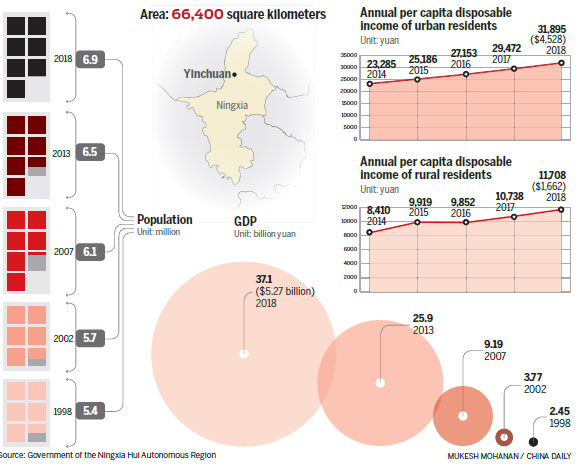Picking the profits from a sweet little earner

Healthy growth
"Goji has traditionally been regarded as a good health supplement by Chinese people. Almost everywhere we can see people carrying a glass of water boiled with dried goji berries," said Jia Dengqi, head of the Zhongning International Goji Trade Center, in Zhongning county.
"Demand for goji has been rising and we have seen increasing numbers of buyers from overseas including Japan, the United States and Europe."
Zhongning is where goji originated, and berries produced in the area reputedly have the best healthcare benefits, such as boosting energy and protecting eyesight.
This has resulted in goji from other areas, such as Qinghai and Gansu provinces, being branded misleadingly in the domestic market as produced in Zhongning.
"Compared with goji produced in other areas, goji produced in Zhongning contains less sugar, so it is lighter and tastes slightly bitter," Jia said.
Zhang Rong, who sells dried goji berries in the center, said he gets at least 80 yuan per kilogram, about 20 yuan higher than last year.
"Most of my buyers are tourists from outside Zhongning, who buy goji as a gift for their relatives or friends," he said.
Hao Xiangfeng, chairman of Bairuiyuan, a leading producer of goji in Yinchuan, said their market research showed there was a potentially huge youth market for goji.
"Traditionally, elderly people use goji as a supplement in porridge or wine," he said. "But this method of goji consumption may not appeal to younger people."
To attract younger customers, the company has developed new products in recent years, including freshly preserved goji, so people can eat it as a snack, and tea made of goji leaves, he said.
With rising demand from consumers for high quality and safe goji products, the company is also improving production methods. Pesticide residue has not been detected in their products for several years, he said.
Zeng Shaofeng, deputy general manager of Ningxia Runde Group, said the company has been producing organic goji berries for several years with no pesticide residue.
Zhou Jiaqi, president of the Zhongning Goji Industrial Association, said new technologies were being studied to improve the quality of goji.
"With big data technologies, farmers will be guided in goji production, including finding the best time to plant, removing pests and when to harvest," he said.
"Production and sale of goji will not be based on experience, but on data."
Challenges ahead
Despite the rapid advances in goji production, there are still challenges ahead for the industry.
The Ningxia Goji Industry Development Center believes a compromise has not been reached between improving the quality of the product and ensuring the healthy growth of the industry.
The use of chemical pesticides remains the primary pest control method, and more efforts should be made to promote the use of biological pesticides.
The center wants authorities to subsidize farmers who use biological pesticides. They should also put in place policies to encourage the research, development and production of biological pesticides.
Zhang Rong, from the Ningxia Academy of Agricultural and Forestry Sciences, said they had promoted the use of biological pesticides for this year's harvest.
But obstacles remained, such as the higher cost of biological pesticides and the fact that they take effect more slowly.
A major obstacle to the development of the industry in Ningxia, and the rest of the country, is the lack of a national standard for pesticide residue levels in dried goji, which also hampers export of the berries, Zhang said.
The Ministry of Agriculture and Rural Affairs is formulating a national standard that will set residue limits for commonly used pesticides for goji berries. But time is needed for the standard to be finalized, Zhang said.
Jia, head of the goji trade center, said although China is a major producer of the berry, many domestic producers lack the ability to develop higher-end products, such as nutritional extracts, that would bring more profit.
"As far as I know, many domestic institutes are intensifying research and development of new products sourced from goji that cater to the market," he said.
"I believe domestic producers will make great progress in processing goji within the next three to five years."








